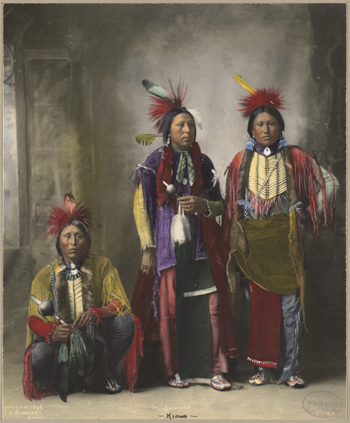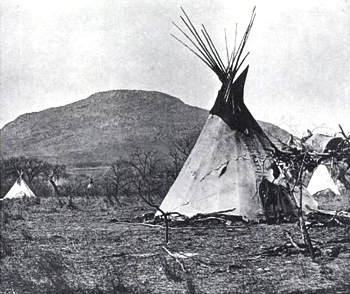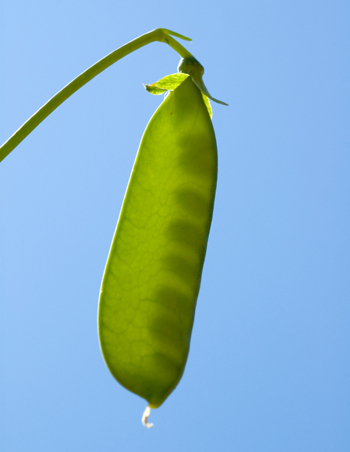N. Scott Momaday (born 1934)
A single knolla small hill rises out of the plain in Oklahoma, north and west of the Wichita Range. For my people, the Kiowas, it is an old landmark, and they gave it the name Rainy Mountain. The hardest weather in the world is there. Winter brings blizzards, hot tornadic winds arise in the spring, and in summer the prairie is an anvil's edge. The grass turns brittle and brown, and it cracks beneath your feet. There are green belts along the rivers and creeks, linear groves of hickory and pecan, willow and witch hazel. At a distance in July or August the steaming foliage seems almost to writhe in fire.What image does this description create in your mind? Great green and yellow grasshoppers are everywhere in the tall grass, popping up like corn to sting the flesh, and tortoises crawl about on the red earth, going nowhere in the plenty of time. Loneliness is an aspect of the land. All things in the plain are isolate; there is no confusion of objects in the eye, but one hill or one tree or one man. To look upon that landscape in the early morning, with the sun at your back, is to lose the sense of proportion. Your imagination comes to life, and this, you think, is where Creation was begun.
I returned to Rainy Mountain in July. My grandmother had died in the spring, and I wanted to be at her grave. She had lived to be very old and at last infirm. Her only living daughter was with her when she died, and I was told that in death her face was that of a child.
I like to think of her as a child. When she was born, the Kiowas were living the last great moment of their history. For more than a hundred years they had controlled the open range from the Smoky Hill River to the Red, from the headwaters of the Canadian to the fork of the Arkansas and Cimarron. In alliance with the Comanches, they had ruled the whole of the southern Plains. War was their sacred business, and they were among the finest horsemen the world has ever known. But warfare for the Kiowas was preeminently a matter of disposition rather than of survival, and they never understood the grim, unrelenting advance of the U.S. Cavalry. When at last, divided and ill-provisioned, they were driven onto the Staked Plains in the cold rains of autumn, they fell into panic. In Palo Duro Canyon they abandoned their crucial stores to pillageto rob violently and by force and had nothing then but their lives. In order to save themselves, they surrendered to the soldiers at Fort Sill and were imprisoned in the old stone corral that now stands as a military museum. My grandmother was spared the humiliation of those high gray walls by eight or ten years, but she must have known from birth the affliction of defeat, the dark broodingfocused on or preoccupied with gloomy thoughts or memories of old warriors.
Her name was Aho, and she belonged to the last culture to evolve in North America. Her forebears came down from the high country in western Montana nearly three centuries ago. They were a mountain people, a mysterious tribe of hunters whose language has never been positively classified in any major group. In the late seventeenth century they began a long migration to the south and east. It was a journey toward the dawn, and it led to a golden age. Along the way the Kiowas were befriended by the Crows, who gave them the culture and religion of the Plains. They acquired horses, and their ancient nomadicfree-roaming; without a permanent location; wandering spirit was suddenly free of the ground. They acquired Tai-me, the sacred Sun Dance doll, from that moment the object and symbol of their worship, and so shared in the divinity of the sun. Not least, they acquired the sense of destiny, therefore courage and pride. When they entered upon the southern Plains they had been transformed. No longer were they slaves to the simple necessity of survival; they were a lordly and dangerous society of fighters and thieves, hunters and priests of the sun. According to their origin myth, they entered the world through a hollow log. From one point of view, their migration was the fruit of an old prophecy, for indeed they emerged from a sunless world.
Although my grandmother lived out her long life in the shadow of Rainy Mountain, the immense landscape of the continental interior lay like memory in her blood. She could tell of the Crows, whom she had never seen, and of the Black Hills, where she had never been. I wanted to see in reality what she had seen more perfectly in the mind's eye, and traveled fifteen hundred miles to begin my pilgrimage.
Yellowstone, it seemed to me, was the top of the world, a region of deep lakes and dark timber, canyons and waterfalls. But, beautiful as it is, one might have the sense of confinement there. The skyline in all directions is close at hand, the high wall of the woods and deep cleavagesa space or opening; a division of shade. There is a perfect freedom in the mountains, but it belongs to the eagle and the elk, the badger and the bear. The Kiowas reckoned their stature by the distance they could see, and they were bent and blind in the wilderness.Which literary device does Momaday employ here?
 In Summer, Kiowa, by Frank A. Rinehart
In Summer, Kiowa, by Frank A. Rinehart
"When she was born, the Kiowas were living the last great moment of their history."
Descending eastward, the highland meadows are a stairway to the plain. In July the inland slope of the Rockies is luxuriant with flax and buckwheat, stonecrop and larkspur. The earth unfolds and the limit of the land recedes. Clusters of trees, and animals grazing far in the distance, cause the vision to reach away and wonder to build upon the mind. The sun follows a longer course in the day, and the sky is immense beyond all comparison. The great billowing clouds that sail upon it are shadows that move upon the grain like water, dividing light. Farther down, in the land of the Crows and Blackfeet, the plain is yellow. Sweet clover takes hold of the hills and bends upon itself to cover and seal the soil. There the Kiowas paused on their way; they had come to the place where they must change their lives. The sun is at home on the plains. Precisely there does it have the certain character of a god. When the Kiowas came to the land of the Crows, they could see the dark lees of the hills at dawn across the Bighorn River, the profusion of light on the grain shelves, the oldest deity ranging after the solstices. Not yet would they veer southward to the caldron of the land that lay below; they must wean their blood from the northern winter and hold the mountains a while longer in their view. They bore Tai-me in procession to the east.
A dark mist lay over the Black Hills, and the land was like iron. At the top of a ridge I caught sight of Devil's Tower upthrust against the gray sky as if in the birth of time the core of the earth had broken through its crust and the motion of the world was begun. There are things in nature that engender an awful quiet in the heart of man; Devil's Tower is one of them. Two centuries ago, because they could not do otherwise, the Kiowas made a legend at the base of the rock. My grandmother said:
Eight children were there at play, seven sisters and their brother. Suddenly the boy was struck dumb; he trembled and began to run upon his hands and feet. His fingers became claws, and his body was covered with fur. Directly there was a bear where the boy had been. The sisters were terrified; they ran, and the bear after them. They came to the stump of a great tree, and the tree spoke to them. It bade them climb upon it, and as they did so it began to rise into the air. The bear came to kill them, but they were just beyond its reach. It reared against the tree and scored the bark all around with its claws. The seven sisters were borne into the sky, and they became the stars of the Big Dipper.What characteristics of creation stories can you find in this story?
From that moment, and so long as the legend lives, the Kiowas have kinsmen in the night sky. Whatever they were in the mountains, they could be no more. However tenuousweak; unsubstantial; lacking in strength their well-being, however much they had suffered and would suffer again, they had found a way out of the wilderness.
My grandmother had a reverence for the sun, a holy regard that now is all but gone out of mankind. There was a wariness in her, and an ancient awe. She was a Christian in her later years, but she had come a long way about, and she never forgot her birthright. As a child she had been to the Sun Dances; she had taken part in those annual rites, and by them she had learned the restoration of her people in the presence of Tai-me. She was about seven when the last Kiowa Sun Dance was held in 1887 on the Washita River above Rainy Mountain Creek. The buffalo were gone. In order to consummateto perfect; to bring to a state of completion the ancient sacrifice--to impale the head of a buffalo bull upon the medicine tree--a delegationa group of people chosen to represent a larger population of old men journeyed into Texas, there to beg and barter for an animal from the Goodnight herd. She was ten when the Kiowas came together for the last time as a living Sun Dance culture. They could find no buffalo; they had to hang an old hide from the sacred tree. Before the dance could begin, a company of soldiers rode out from Fort Sill under orders to disperse the tribe. Forbidden without cause the essential act of their faith, having seen the wild herds slaughtered and left to rot upon the ground, the Kiowas backed away forever from the medicine tree. That was July 20, 1890, at the great bend of the Washita. My grandmother was there. Without bitterness, and for as long as she lived, she bore a vision of deicidethe death of a god .
Now that I can have her only in memory, I see my grandmother in the several postures that were peculiar to her: standing at the wood stove on a winter morning and turning meat in a great iron skillet; sitting at the south window, bent above her beadwork, and afterwards, when her vision failed, looking down for a long time into the fold of her hands; going out upon a cane, very slowly as she did when the weight of age came upon her; praying. I remember her most often at prayer. She made long, rambling prayers out of suffering and hope, having seen many things. I was never sure that I had the right to hear, so exclusive were they of all mere custom and company. The last time I saw her she prayed standing by the side of her bed at night, naked to the waist, the light of a kerosene lamp moving upon her dark skin. Her long, black hair, always drawn and braided in the day, lay upon her shoulders and against her breasts like a shawl. I do not speak Kiowa, and I never understood her prayers, but there was something inherently sad in the sound, some merest hesitation upon the syllables of sorrow. She began in a high and descending pitch, exhausting her breath to silence; then again and again--and always the same intensity of effort, of something that is, and is not, like urgency in the human voice. Transported so in the dancing light among the shadows of her room, she seemed beyond the reach of time. But that was illusion; I think I knew then that I should not see her again.
Houses are like sentinels in the plain, old keepers of the weather watch.What would be a literal translation of this simile? There, in a very little while, wood takes on the appearance of great age. All colors wear soon away in the wind and rain, and then the wood is burned gray and the grain appears and the nails turn red with rust. The windowpanes are black and opaque; you imagine there is nothing within, and indeed there are many ghosts, bones given up to the land. They stand here and there against the sky, and you approach them for a longer time than you expect. They belong in the distance; it is their domain.
 Pacer's Camp, by William S. Soule
Pacer's Camp, by William S. Soule
"Houses are like sentinels in the plain, old keepers of the weather watch."
Once there was a lot of sound in my grandmother's house, a lot of coming and going, feasting and talk. The summers there were full of excitement and reunion. The Kiowas are a summer people; they abide the cold and keep to themselves, but when the season turns and the land becomes warm and vital they cannot hold still; an old love of going returns upon them. The aged visitors who came to my grandmother's house when I was a child were made of lean and leather, and they bore themselves upright. They wore great black hats and bright ample shirts that shook in the wind. They rubbed fat upon their hair and wound their braids with strips of colored cloth. Some of them painted their faces and carried the scars of old and cherished enmitiesa feeling of hatred or ill-will . They were an old council of warlords, come to remind and be reminded of who they were. Their wives and daughters served them well. The women might indulge themselves; gossip was at once the mark and compensation of their servitude. They made loud and elaborate talk among themselves, full of jest and gesture, fright and false alarm. They went abroad in fringed and flowered shawls, bright beadwork and German silver. They were at home in the kitchen, and they prepared meals that were banquets.
There were frequent prayer meetings, and great nocturnal feasts. When I was a child I played with my cousins outside, where the lamplight fell upon the ground and the singing of the old people rose up around us and carried away into the darkness. There were a lot of good things to eat, a lot of laughter and surprise. And afterwards, when the quiet returned, I lay down with my grandmother and could hear the frogs away by the river and feel the motion of the air.
Now there is a funeral silence in the rooms, the endless wake of some final word. The walls have closed in upon my grandmother's house. When I returned to it in mourning, I saw for the first time in my life how small it was. It was late at night, and there was a white moon, nearly full. I sat for a long time on the stone steps by the kitchen door. From there I could see out across the land; I could see the long row of trees by the creek, the low light upon the rolling plains, and the stars of the Big Dipper. Once I looked at the moon and caught sight of a strange thing. A cricket had perched upon the handrail, only a few inches away from me. My line of vision was such that the creature filled the moon like a fossil. It had gone there, I thought, to live and die, for there, of all places, was its small definition made whole and eternal. A warm wind rose up and How does this simile work to describe the author's feeling of longing? purled to flow in a rippling motion like the longing within me.How does this simile work to describe the author's feeling of longing?
The next morning I awoke at dawn and went out on the dirt road to Rainy Mountain. It was already hot, and the grasshoppers began to fill the air. Still, it was early in the morning, and the birds sang out of the shadows. The long yellow grass on the mountain shone in the bright light, and a scissortail hiedhurried above the land. There, where it ought to be, at the end of a long and legendary way, was my grandmother's grave. Here and there on the dark stones were ancestral names. Looking back once, I saw the mountain and came away.
 In Summer, Kiowa, by Frank A. Rinehart
In Summer, Kiowa, by Frank A. Rinehart

